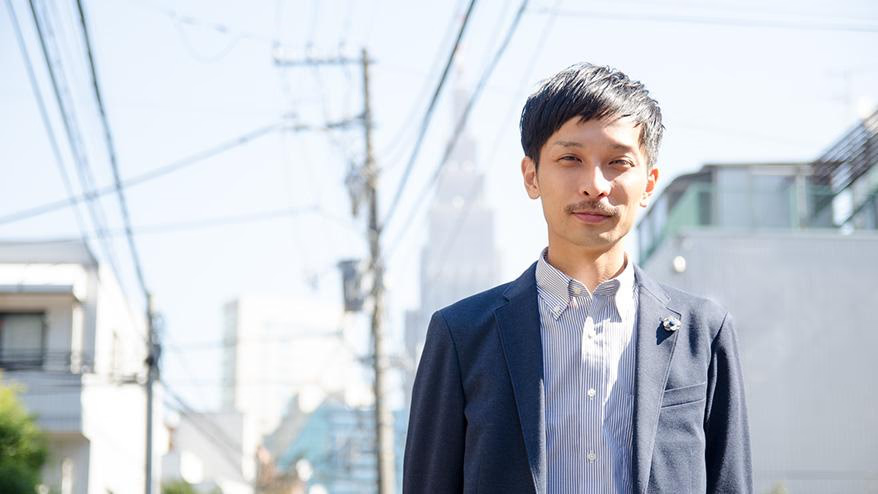Nice to meet you. My name is Haga and I graduated from the second batch of Kamiyama Monosasu Juku at the end of last year and became a member of the Marketing Department this year.
This time, I would like to write about how I left Hiroshima, where I was born and raised, gained experience in Kamiyama, and then joined Monosus in Yoyogi!
26 years in Hiroshima, 6 years in a clothing store
I'm from Hiroshima Prefecture.
Facing the Seto Inland Sea, the prefecture has a mild climate, and the majestic mountains in the north are a great place to enjoy autumn foliage and winter sports. The prefecture is home to two World Heritage sites (Itsukushima Shrine and the Atomic Bomb Dome), and seven large rivers run through the city.
I was born and raised in a place where the seasons change beautifully. Local specialties include oysters and lemons (Onomichi's lemon farm, Tatemichiya , is well-known at Monosus!), soul food okonomiyaki (be careful not to call it Hiroshima-yaki, as Hiroshima residents will get angry...), and more.
I love Hiroshima, but I have no interest in the local baseball or soccer teams.
On my days off, I like to drop into one of Hiroshima's long-standing movie theaters to watch a film, or visit an art museum to encounter some difficult art.
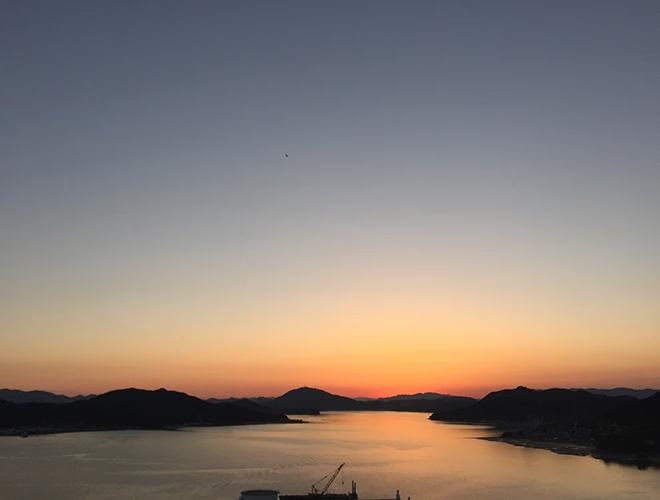
The scenery of Hiroshima, where the beauty of the many islands in the Seto Inland Sea is soothing.
That's where I ended up in the fashion industry.
I've loved clothes since I was a child, and for about six years I worked as a staff member at a long-established select shop in Hiroshima City, where I was involved in retail sales and buying.
I spent my days talking to customers at the store, proposing outfits and helping them solve problems, and racking my brains over how to select products that would fit the store's unique style while also taking into account current trends.
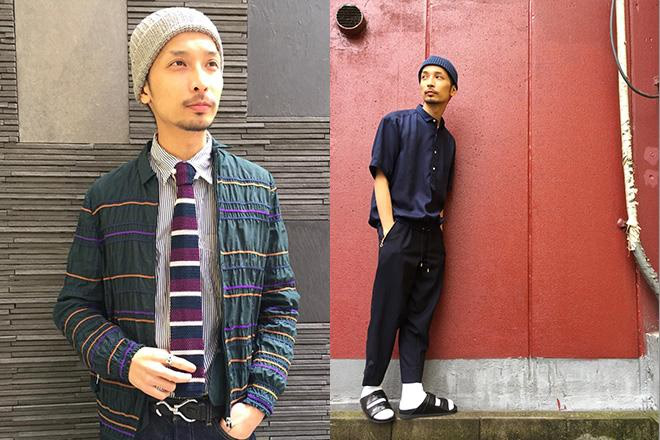
When I was a salesperson, I thought about clothes day and night.
I first became interested in the web because I was using social media (Instagram and Facebook) to share information about my shop. However, I had no actual knowledge or experience of the web.
I first learned about the company Monosus through an article on a certain website.
This site, called " Nihon Shigoto Hyakka ," is a job information site that has been featured several times on Monosas' homepage.
The catchy copy, "Job hunting for people who work like they live," serves as a guide for people who are searching for new ways of working.
While working in Hiroshima, I couldn't imagine myself continuing to work in the same place for the foreseeable future, and I was feeling a bit uneasy. One day, I happened to look into the Nihon Shigoto Hyakka department store, and I came across a sentence that caught my attention.
"Work with people you want to live with"
These were the words of the company's CEO, Hayashi. At the same time, what caught my eye was the unfamiliar combination of "Web + Countryside."
Looking back, it was a simple intuition, and at the time I thought, "I have no choice but to accept it."
( Click here for the article from that time.)
Many things learned in Kamiyama, 600m above sea level
I was fortunate enough to become a student at the school, and set foot in Kamiyama Town, Tokushima Prefecture, for the first time in July of last year as part of the second class of the employment-based vocational training program "Kamiyama Monosasu Juku," which Monosasu has been running since the year before last.
We started the trip by living together for a month at the Kamiyama Ski Land Hotel with 10 other people from all over Japan in a place we had never been to or even heard of before.
I code during the day, review my lessons at night, and occasionally explore.
For me, who had never left Hiroshima, let alone my parents' house, everything in my daily life was new to me. I made dinner with the members (I can't cook, so I mainly played the role of supporting them), and learned from my father, who runs the hotel, how to butcher a wild boar, how to smoke food, and even the secret of Solomon's treasure that lies in Tokushima?!

Left: Being taught how to butcher a wild boar by a man from Ski Land Hotel.
Right: A large amount of meat was smoked using a smoker made by my dad using a huge duct.
Every day I absorb everything I have ever experienced before.
After our time at the ski land, five of us male students began living in an old house (at an altitude of 600m!) located on top of a mountain in Kamiyama, a remote area by chance.
They make their own compost to process food waste, hold events that take advantage of the location (dinner parties and film screenings while watching the Milky Way, etc.), and set up a stall at the 4K Tokushima Film Festival using the large amount of yuzu that grows on the premises...
Even if something seems silly at first glance, if you work on it seriously, it will have an impact on those around you and naturally draw them in. The students are always on the lookout for interesting things in their daily lives, and always give their all when they work on something. I've always lived a relatively passive life, so it goes without saying that I was influenced by these students.
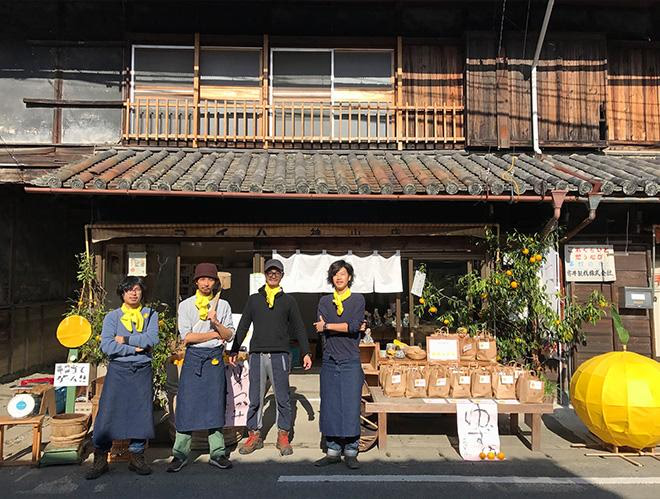
The scene of selling Yuzu at the 4K Tokushima Film Festival. It was featured in local newspapers and on TV, and drew a quiet response.
Who am I and where am I heading?
Of the classes I took over the past six months, I would say that the one that sparked my interest in the Marketing Department was the class taught by Tochizawa Keiji*1 and Nishimura Yoshiaki*2.
*1 Keiji Tochizawa: CEO of Connecting Rod, copywriter, and creative director. In charge of the second term of the Kamiyama Monosasu Juku writing course.
*2 Yoshiaki Nishimura: Representative of Living World, planning director, and work style researcher. He is in charge of the second interview course of the Kamiyama Monosasu Juku.
At the writing class taught by Tochizawa Keiji, we started by being given only a pencil and an eraser.
"What do you want to say? Who are you speaking to? Is there objectivity in what you say?"
Even if it's something obvious, there is a huge difference between being conscious of it and not being conscious of it. Each time we were given a different topic and the class where we just had to write by hand was a lot of fun.
To mention a few specific issues:
Try things like "writing a map in text and explaining how the person can reach their destination using only that," "introducing your favorite place in a thrilling sentence that makes the reader want to go there," or even coming up with a "catchy slogan that will draw people in."
One assignment was to create a proposal for a solution for a rather selfish coffee-loving cyclist who wanted to be able to drink coffee without spilling it or burning his tongue. What could be done?
All of these tasks were difficult, but I kept in mind the message that Tochizawa-san spoke about at the beginning: "Basically, words are the only way to convey your feelings," and spent my days simply clutching my pencil.
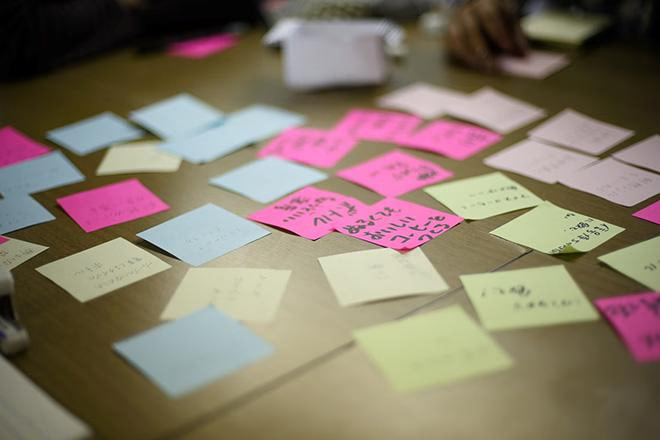
The students brainstormed together as part of an assignment to write a one-page business proposal.
During Nishimura Yoshitetsu's interview class, I realized how little I usually listen to what people say.
"The person listening has overwhelming power, not the person speaking," says Nishimura.
Ignoring, taking over, denying, getting ahead of others... During the workshop, I realized how much of an impact the way you listen to someone can have.
"Ignoring" to "Responding"
From "stealing" to "respecting"
"Negation" to "Acceptance"
Change "ahead of" to "follow".
That alone will allow the other person to talk about what they really want to talk about.
To do this, you need to be interested in the other person themselves, more than their hobbies or values.
I learned that this leads to the question, "Who are you and where are you going?"
This is also a question to ask yourself.
By getting to know the other person, you get to know yourself. From there, I was able to reaffirm what I want to become and what kind of person I am.
Learning from Mr. Tochizawa and Mr. Nishimura about "how to communicate" and "how to listen" gave me the opportunity to reconsider how I want to work in the future.
I believe that this is also connected to my current planning and reporting work (which I still have a long way to go...).
Working with people who want to live together
In the past, whenever I would start something new or face a challenge, I would always think, "Can I really do this?" and would not take action. I was always cautious and could not move forward.
In Kamiyama, I came across a keyword that will be a guide for the future. It was something that the director, Hayashi, said to the students: "Instead of thinking about whether you can do it, it's important to decide that you're going to do it."
Rather than hesitating out of fear of failure, just decide, "Okay, let's do it!" Even if you fail, it will be an experience that you can use to your advantage.
And over the past six months or so I've met people who are putting this into practice.
What these fascinating people have in common is that their lives and work are loosely connected. The students who gathered at Kamiyama Monosasu Juku also arrived at this conclusion while searching for ways to work and live.
Through repeated trial and error, you create your own way of life.
People who live their lives based on their own values and standards, values that cannot be measured by common sense, seem truly wonderful.
Living and learning with these people has helped me to get to know myself better, and I have decided that I want to work with these people from now on.
From Hiroshima to Kamiyama, and then to Tokyo. A new journey has only just begun.
Thank you all for your continued support.
